Features
Red Dead Redemption II: The Defining Game of the Generation
Red Dead Redemption II is a mind-boggling technical achievement. There has never been an open world video game crammed full of so much meaningful content, and one in which every facet is polished to such an exceptional degree. The outstanding mission design, consistently brilliant writing and acting, and superlative long-form storytelling makes this Rockstar’s best ever game, and the defining game of the generation so far.
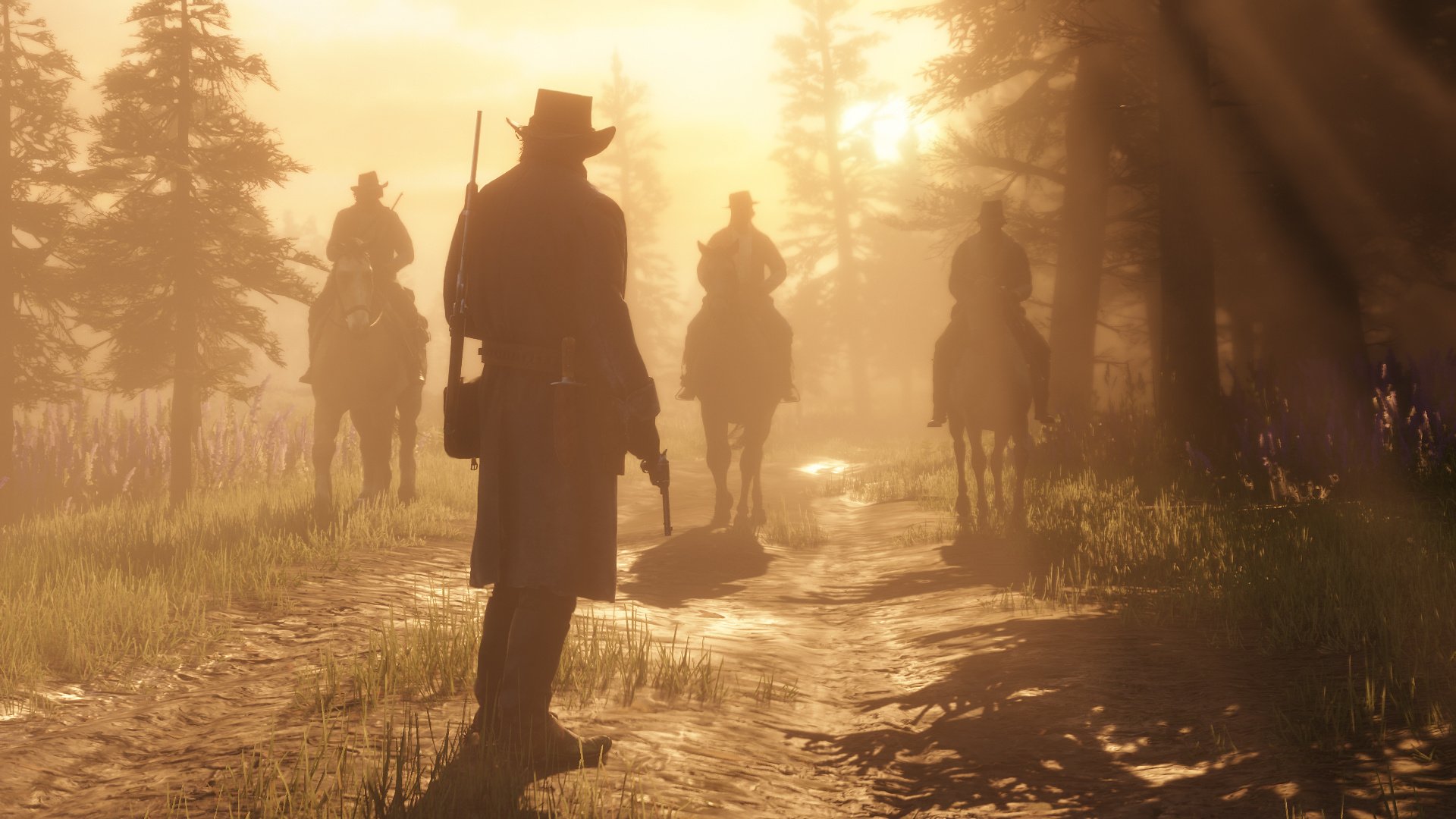
Red Dead Redemption II Review
Developer: Rockstar Games | Publisher: Rockstar Games| Genre: Action/Adventure |
Platforms: PS4, Xbox One, PC | | Reviewed on: PS4
Red Dead Redemption II is one of those rare, monumental video games that seems destined to serve as a watershed moment for the industry going forward, like a great chasm separating everything that came before from everything that is yet to come. The virtual world in which this game takes place is so far above and beyond what we’ve seen in an open world setting before that you’ll likely still be left gawping at the screen when you’re sixty hours deep, still discovering, still exploring, still aghast at how this technological marvel ever came to be. Never before has an open world game been crafted with this level of polish, and if it were to be suggested that some form of witchcraft or sorcery were involved in its creation, even sceptics of the supernatural might find themselves swayed to believing in all manner of uncanny phenomena.
It’s the sort of game that only a studio that made truck loads of money with their last release can afford to make without concern; a surprisingly risky triple-A blockbuster, one that appears to care not one whit what gamers — hardcore or casual — want or expect, and one that makes no attempt to follow the accepted norms, for better and worse. This is a slow-burning historical drama set in the Old West, one that at times seems to meander, and at other times hurtles with such electrifying pace that you won’t be able to stop yourself from grinning out of sheer, giddy, childish glee. The methodical approach Rockstar has taken to storytelling here is mirrored in the gameplay: you’ll spend just as much time riding your horse to the next town over with nought but the chirping birds for company as you will getting into gunfights and drunken punch-ups in seedy saloons.
It’s a story that unfolds not like a movie with a definitive beginning, middle, and end, but more akin to a television series comprised of dozens of smaller arcs, some more important than others, but each in service in some way of driving the story forward — however slightly — to its inexorable conclusion. It’s beautiful, overwhelming, tedious, exhilarating, ugly, fascinating, funny, tragic, exhausting, and utterly, utterly engrossing. It’s awesome in the literal sense of the word. It’s also the defining game of the generation.
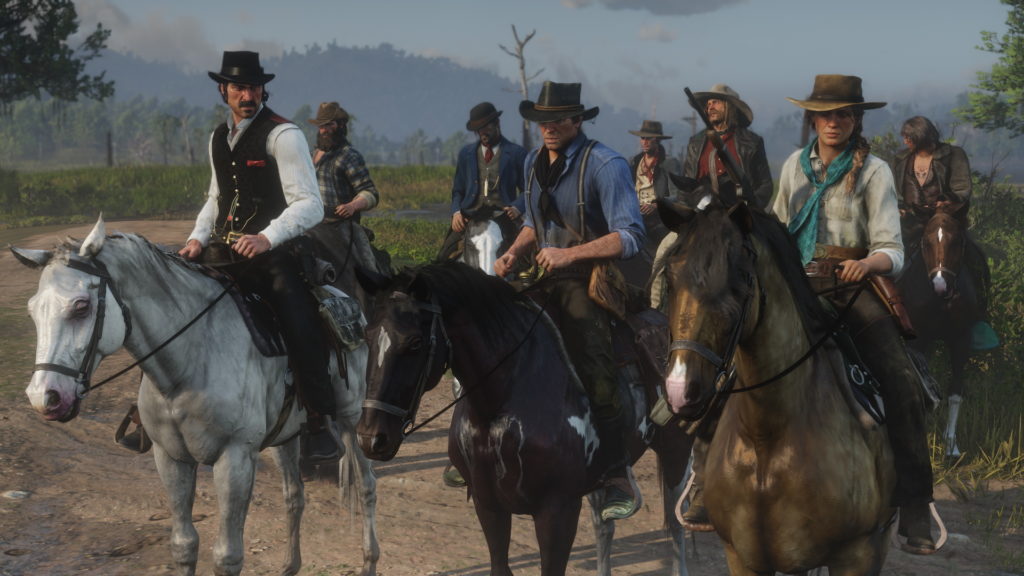
Set in 1899, Red Dead Redemption II is a prequel to the original game released on PlayStation 3 and Xbox 360 back in 2010, but familiarity with that title is by no means a prerequisite for enjoying the story here. Those who have played the original will see characters they remember and locales they’ve visited, but II tells a standalone story that works entirely as is.
We play as Arthur Morgan, a lieutenant in a gang of outlaws led by the charismatic, loquacious, Dutch Van der Linde. We meet the gang in the wake of a botched robbery in the town of Blackwater that has alerted lawmakers to both their whereabouts and their identities. They’re forced to go on the run, leaving their base of operations and their accumulated wealth behind, hoping that heading east will keep them out of reach of the long arm of the law while they come up with a plan for a more permanent method of escape. The east represents everything the gang fears about America at the turn of the century — law, civilization, progress, government, and an end to their way of life — but with the only other path available to them seemingly leading to the end of the hangman’s rope, they turn tail and flee through the mountains towards uncertainty.
The opening hours of Red Dead Redemption II are perhaps not as action-packed as you might expect, and if you’re going into the game expecting Grand Theft Auto on horseback, then you might find yourself left wanting. The early missions see Arthur and Dutch braving the harsh mountain weather in search of food and shelter, and we learn what has gone wrong for the group through their conversations as they walk or ride. The gang has suffered losses — not only financially, but in numbers, too. Not everyone made it out of Blackwater alive, and without money or food, others will surely perish in the days and weeks to come.

Some within the gang are ostensibly good people that joined up to escape their troubled lives, while others are dangerous, sociopathic criminals who seem like they’d be perfectly happy robbing and murdering for the rest of their days — whether they get paid or not. The one thing these people have in common is their belief in the man calling the shots; Dutch Van der Linde makes for an intriguing, almost cult leader-like figure, charismatic enough to hold his disparate group of misfits and miscreants together despite their varied backgrounds, genders, ethnicities, and general dispositions. But as the game progresses and as the various storylines unfold, it becomes harder for Dutch to hold his increasingly fractured group together with promises of a paradise that’s always just one big score away, only for it to all go awry and leave them deeper in the mire, time and again.
Rockstar Games’ stubborn determination to tell their story their way pays off. It would have been easy to throw in more turret sections or blow more things up, or to build the narrative around larger than life, satirical caricatures. Too often in the past they’ve relied on casts of despicable but entertaining characters, anti-heroes that we couldn’t really care about but would make us laugh or shock us. Here, they’ve created a varied, layered, complicated bunch — more grounded, more real, and more like people with genuine motivations and reasons for doing the things they do.
This isn’t Blazing Saddles, or even Django Unchained. It’s more like Unforgiven, or The Good, the Bad, and the Ugly. It’s a captivating, absorbing yarn about the end of a way of life, the Wild West coming up against the indomitable march of progress, and it’s told slowly and deliberately across many missions, spanning many hours. But it’s also about the things people will do when they become desperate, about loyalty and the price of it, about coming to terms the bad deeds you’ve committed in the past and not allowing them to prevent you from doing good in the future, and about accepting your inevitable fate rather than fighting it to the detriment of everyone around you. In a twenty-hour game, some of the narrative twists and turns might feel forced, but here, by the time the sensational, genuinely exciting finale rolls around after sixty hours, if you’re anything like us, you’ll be out of your chairs willing every punch and gunshot to land.
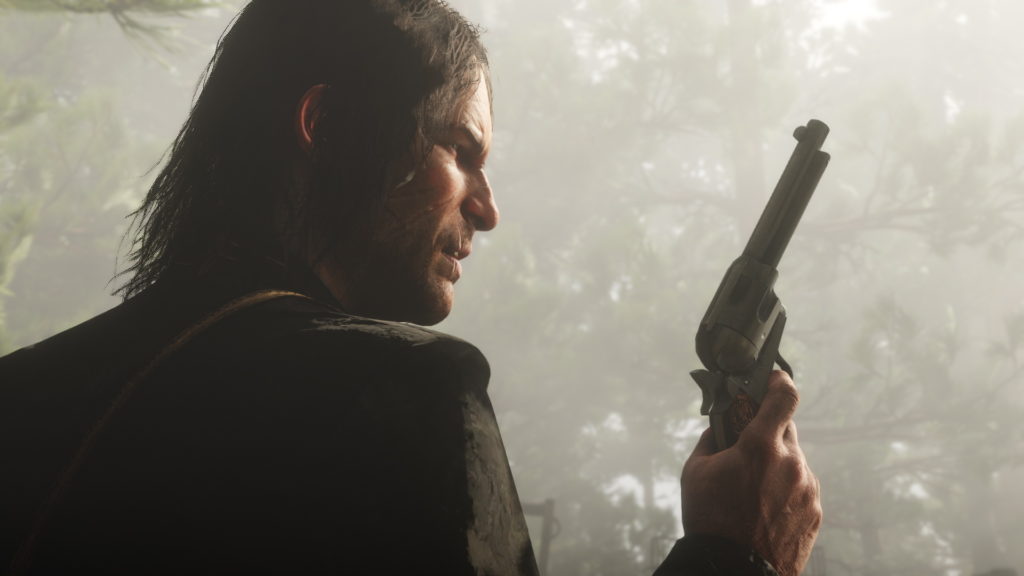
In a less ambitious, less self-assured game being crafted by a studio with less of a financial cushion, it’s easy to see how executives in suits could have demanded some changes to make the experience more accessible, but Rockstar Games’ more grounded approach here has paid dividends. This is their best ever story, featuring their best ever cast of characters.
There are other areas of the game in which Rockstar’s intransigence, their disinclination to adhere to contemporary standards in gaming are not such a success. The controls in particular feel positively archaic, and while you will undoubtedly get used to them over time — and it is certainly worth persevering — it’s impossible to ignore the obvious fact that at times Red Dead Redemption II feels like a game a decade older than it is. Everything feels slightly more complicated than it needs to be; you’re always being asked to hold buttons when surely a single press would do, you’re required to tap X to sprint when I think we’ve all pretty much accepted now that just clicking L3 will suffice, and the aiming in gunfights is finicky enough to make auto-aim practically a necessity.
There’s also huge stretches of time spent playing the game in which you might feel like you’re doing little of any consequence, and while these quieter moments do a wonderful job in terms of world building, there’s no escaping the fact that some people are going to wonder why they’re shovelling pigshit and talking to an old feller about his past rather than blasting fools with their shootin’ irons. A slow and methodical game like this is simply not going to be everybody’s cup of tea; think The Last of Us rather than Uncharted, and sixty hours long. You’re going to spend an incredible amount of time riding your horse alone, buying new shirts or hats, hunting for meat or fish to keep your camp fed, and (seriously) waiting for your beard to grow.
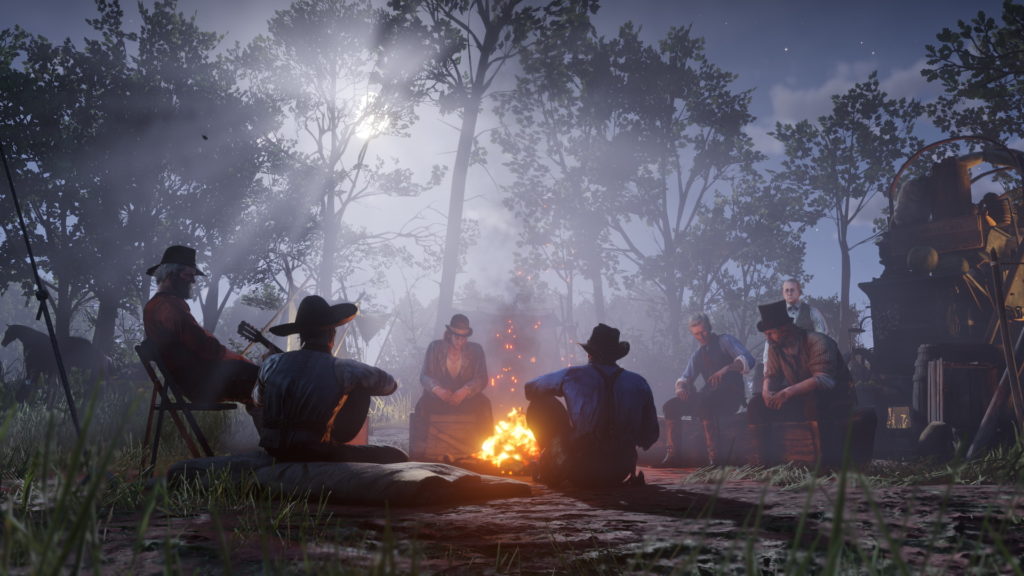
Depending on how enamoured you become with the world that Rockstar Games has created for you here, you’re either going to want to spend as much time in it as possible, exploring every nook and cranny, finding every secret, and talking to every character, or you’re going to find a lot of the time spent outside of main missions a bit of a damp squib.
The mission structure throughout the game is superb. Despite how many missions there are — and there are a lot — the quality of them never dips or even seems to waver. You’ll generally have to direct Arthur to a member of your posse who’ll set the scene for what’s about to go down, and the journey to wherever the meat of the quest is due to take place will be spent chatting with your companion(s). During these quieter moments, you learn much about your fellow gang members — their pasts, their temperaments, and their feelings about the bigger picture you’re involved in. Even minor characters get moments to shine and give you a reason to care about what happens to them.
There’s an incredible amount of variety in the quests you’ll be given. Some are as simple as performing a menial task or travelling to another location to talk to somebody, others are multi-faceted, elaborate operations involving dozens of characters, multiple locations, and an awful lot of gunfire. The quieter, more laid-back quests help to provide context for the noisy, violent ones, and as a result, every time you take part in a well-planned robbery or rescue a friend from the clutches of an enemy, it feels like a major event. Some of the smaller missions are also the funniest, and while most of the wackiest characters in the game are relegated to side-quest status in Red Dead Redemption II, there are still lots of amusing moments.
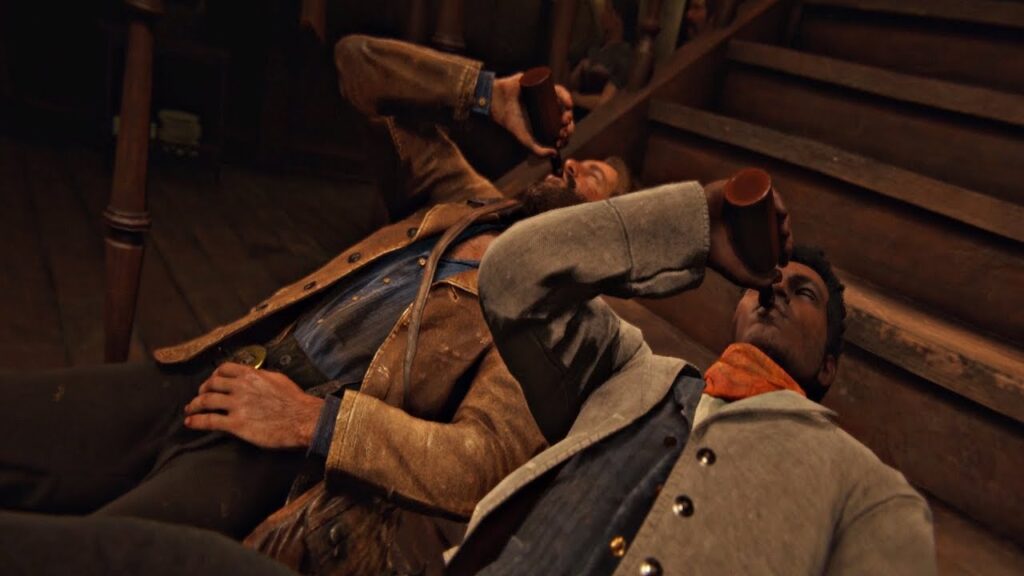
One fantastic early mission sees Arthur head into town with his friend Lenny to go for a “couple of quiet drinks” at the local saloon, and the shenanigans that ensue make for one of the most entertaining gaming moments of 2018. Red Dead Redemption II is littered with gems like this. There are so many of these quality scenarios — some big, some small — that you’ll undoubtedly see more and more people talking about them as they get further into the game. Side-quests are just as well-written and entertaining as the main quests, and many add so much flavour and character development that you’d be robbing yourself if you didn’t experience them.
Voice acting is strong from start to finish, and every NPC in the game can be talked to, whether you choose to be amiable, hostile, or violent with them. The soundtrack is an absolute delight as well —at times minimal, and at others grandiose. There are instances in the game where you’ll have to ride across a long distance without company, and during some of these a song will begin to play. Incredibly, these songs seem perfectly timed to fit the journey — just another example of how Rockstar Games’ painstaking attention to detail and sense of perfectionism has created an adventure that stands head and shoulders above other open world games.
Graphically, the game is beautiful. It takes place across a number of fictional states in America, each with their own unique topography, climates, and ecological systems. To the north, there are snowy peaks populated by wolves and moose, while to the south, there are swamps and the threat of alligators, with everything between. All of these areas are densely populated and absolutely jaw-dropping to behold. Rarely is this more readily apparent than when observing the changing weather conditions or watching wildlife go about its business.
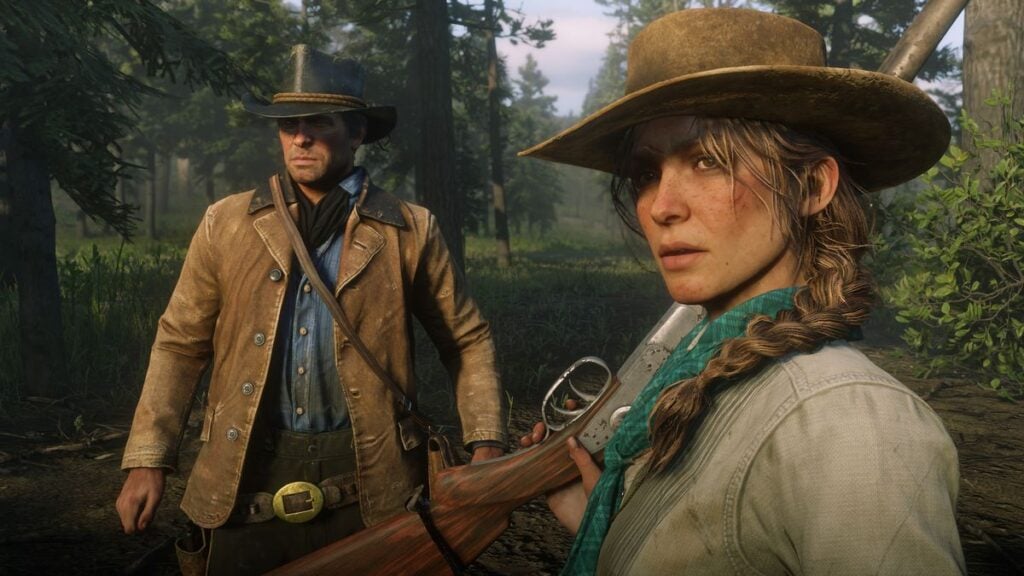
The intricate world is teeming with flaura and fauna, and the animation quality is staggering. Of course, you can hunt animals if you so desire, with some quite obviously being more dangerous than others. Skinning kills means you can have a trapper craft new clothing or holsters for you, while the meat can be donated to camp for the gang’s butcher to use to keep everyone fed. So, if you’re after some killer alligator shoes to go with your elk-skin chaps, then you better get yourself a hunting rifle and put some time aside.
Otherwise, if you want to rely on clothes that don’t require you to go out and skin anything, you can visit a store in one of the many towns. These establishments sell most of everything you’ll need on your adventure, and the level to which you can customize Arthur is really impressive. Beyond clothes, you can change his hairstyle and beard (but only once your hair has grown long enough),as well as change the appearance of your trusty horse. You can upgrade the camp you’re staying at via donations, and you can customize your weapons with engravings, different metal types, and various varnishings.
Towns also offer more than simple stores to peruse. There are saloons where you can eat, drink, and be merry; there are poker and blackjack tables where you can try to win a small fortune; there are theaters to visit where you can watch cabaret that is genuinely entertaining — this is a world so packed with things to see and do, so stuffed with activities, side-quests, and people to meet, that you can kinda believe that they all just carry on living their lives even after you’ve powered down your console.

-

 Culture4 weeks ago
Culture4 weeks agoThe Global Language of Football: Building Community Beyond Borders
-

 Technology3 weeks ago
Technology3 weeks agoGamification and Productivity: What Games Can Teach SaaS Tools
-

 Features1 week ago
Features1 week agoDon’t Watch These 5 Fantasy Anime… Unless You Want to Be Obsessed
-

 Features3 weeks ago
Features3 weeks agoFarewell to a Beloved 13-Year-Old Isekai Anime That Brought Us Endless Laughter
-

 Features2 weeks ago
Features2 weeks agoThis Upcoming Romance Anime Might Just Break the Internet; Trailer Just Dropped!
-

 Culture3 weeks ago
Culture3 weeks agoIs the Gaming Industry Killing Gaming Parties?
-

 Features4 weeks ago
Features4 weeks agoWait, What?! Tom & Jerry Just Turned Into an Anime and It’s Glorious!
-

 Game Reviews3 weeks ago
Game Reviews3 weeks agoCall of Duty and the Myth of Military Realism: Tactical or Just Tacticool?
-

 Guides4 weeks ago
Guides4 weeks agoHow to Earn and Spend Diamonds in Mobile Legends
-

 Features6 days ago
Features6 days ago“Even if it’s used a little, it’s fine”: Demon Slayer Star Shrugs Off AI Threat
-

 Technology3 weeks ago
Technology3 weeks agoDigital Cash: For Gamers Who Don’t Ask Permission?
-

 Guides4 weeks ago
Guides4 weeks agoHow to earn a lot of gold in WoW The War Within, a step-by-step guide when playing as a druid























